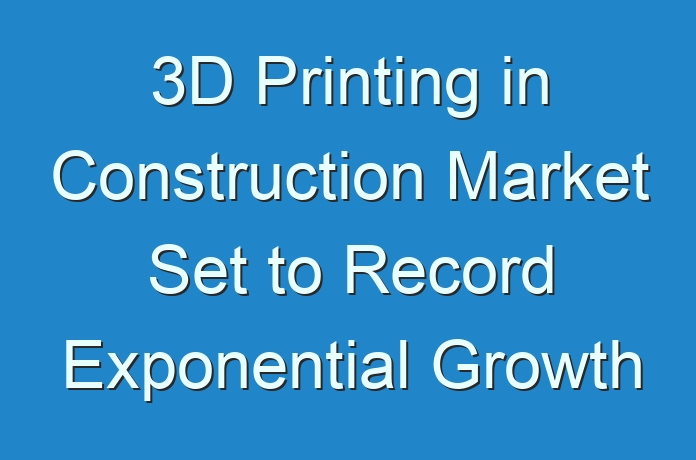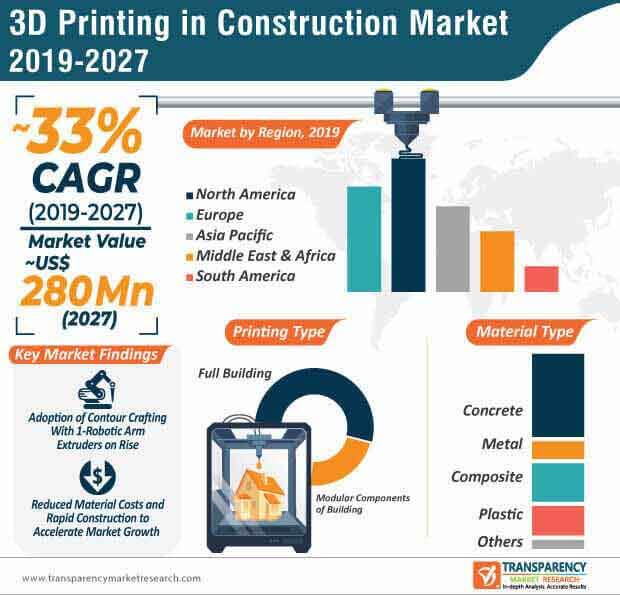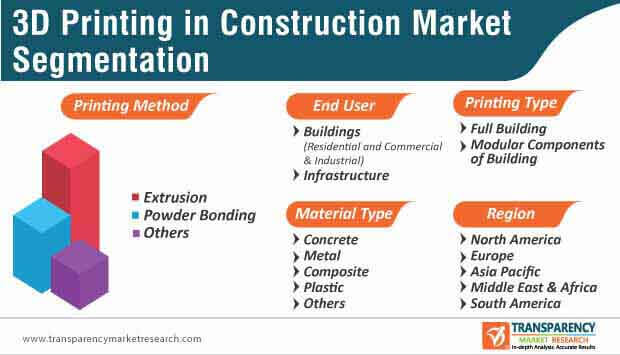
3D Printing to Redefine Construction Sector
The advent of 3D printing is arguably one of the most disruptive innovations that have emerged over past two decades. Evolving from an optimistic attempt made by Professor Behrokh Khoshnevis, University of South Carolina, to create a 3D printed wall, the inclusion of 3D printing in construction has witnessed immense growth. Moreover, 3D printing is extensively used in various industries, including healthcare, aviation, and engineering. For several decades, the construction sector has remained dormant in terms of technological advancements. However, the introduction of 3D printing in construction has gained tremendous popularity, as more number of stakeholders are recognizing the true potential of this technology. This has considerably driven the 3D printing in construction market over the years.
Significant advancements in 3D printing have led to opportunities for the players in the 3D printing in construction market, as 3D printed materials are increasingly being used to build houses. The 3D printing in construction market is expected to gain traction in the coming years, owing to a range of benefits, including reduced material costs, faster construction, significantly lower injuries, and improvements in forms. Due to these benefits, 3D printing in construction market is expected to witness a ten-fold growth during the forecast period and reach a value of ~US$ 280 Mn by 2027 from a modest market value of ~US$ 29 Mn in 2019.

Request a sample to get extensive insights into the 3D Printing in Construction Market
3D Printing to Replace Conventional Construction Techniques
The advent of 3D printing in the construction market has come at a time when the construction sector is aggressively seeking solutions to address a host of problems. According to estimates, the construction sector accounted for nearly 40% of the total waste generated worldwide. Furthermore, civil engineers and architects are largely engaged in negotiating the geometric limitations put forward by the casting process. Drawbacks of manufacturing formworks on job sites, mounting work safety issues, and hurdles in transporting various materials from one location to the other are some of the major issues that 3D printing in construction market could potentially provide answers for.
At present, two 3D printing techniques are increasingly being used across the construction industry – power binding and extrusion gantry system printing. Out of these printing techniques, extrusion 3D printing has gained significant acceptance in the construction sector. Thus, in terms of printing method, the extrusion segment is expected to dominate the 3D printing in construction market with an impressive market share of over 70% during the forecast period (2019-2027). Despite the growing adoption of power binding in 3D printing in construction market, stakeholders are likely to adopt the extrusion printing method, which is expected to grow at a CAGR of ~33% during the forecast period.
To understand how our report can bring difference to your business strategy, Ask for a brochure
A recent advancement in the 3D printing in construction market is the entry of robotic arm extruder – a technology that is popularly referred to as contour crafting. This technology is extensively used to develop extra-large structures within the construction sector.
Construction Industry Enters New Era with 3D Printed Houses and Buildings
The entry of 3D printing in construction market is tipped to transform this sector, as more number of stakeholders are vouching for this novel technology. 3D printing in the construction sector offers several benefits, including reduced material waste, cost-effectiveness as it significantly lowers supply costs of traditional raw materials, platform for innovation, and faster production cycles.
At present, 3D printing in the construction sector is being used to develop buildings and other types of infrastructure. Based on end user, the building segment is expected to account for a share of ~73% of the 3D printing in construction market, in terms of value, and is likely to reach a value of ~US$ 205 Mn by 2027. The 3D printing technique is increasingly being used to build residential, commercial, and industrial buildings. For instance, in 2015, Winsun Decoration Design Engineering, a company based in Shanghai, built around 10 residential houses in 24 hours and the company revealed that the cost of building each house was ~US$ 5,000. The roadmap for using 3D printing in construction is being laid down in Dubai wherein the Prime Minister of the United Arab Emirates announced that around 25% of the city’s new buildings would be built using 3D printers by the end of 2025.

Stuck in a neck-to-neck competition with other brands? Request a custom report on 3D Printing in Construction Market
3D Printing in Construction Market: Overview
- According to Transparency Market Research’s latest research report on the global 3D printing in construction market for the historical period of 2017–2018 and the forecast period of 2019–2027, increase in investments in the building and infrastructure to construct attractive and complex shape buildings at an affordable cost in less time is expected to boost the global market during the forecast period
- In terms of revenue, the global 3D printing in construction market is estimated to reach a value of ~US$ 280 Mn by 2027, expanding at a CAGR of ~33% during the forecast period
Adoption of 3D Printed Buildings in Developed Countries: A Key Driver
- 3D printing in construction is one of the important segments of Industry 4.0, as programming is helpful to construct complex structures accurately, which makes the process of 3D printing easy and rapid. Adoption of this technology offers multiple advantages to construction and architecture sectors.
- Use of the 3D printing technology is helpful in constructing building and infrastructure accurately and cost efficiently, with reduced wastage of material and in less time compared to the traditional construction method
- In 3D printing, various types of materials are used, which include concrete, plastics, metals, composites, and polymers. 3D printers have the capability to use these materials in the extrusion process, which is a type of a 3D printing method gaining traction among multiple manufacturers, owing to its high operational speed and accuracy.
- Several construction companies are realizing the potential of the 3D printing technology and its future impact on the construction sector, due to which they are increasingly adopting 3D printing
- Thus, increase in use of the 3D printing technology to build cost-efficient buildings and infrastructure in less time is anticipated to be a prominent factor driving the global 3D printing in construction market during the forecast period
Increased Flexibility in 3D Printing Operations Using Software Updates: Market Trend
- In the 3D printing technology, along with hardware and materials, software is also an important element required for the development of industrial 3D printing operations
- The year 2018 witnessed rising awareness regarding significance of software for various features of the 3D printing process, from simulation to workflow and security
- With technological advancements, the capability of simulation software is upgraded to achieve advanced simulating printing, and to attain better coordination between simulation software and industrial printing parts. This helps to increase process reliability, optimize machine performance, and reduce material waste.
- Since multiple companies are focusing on the expansion of their business operations, focusing on software is also becoming important for managing and streamlining the 3D printing process at all stages
- For instance, in December 2018, AMFG, a U.K.-based company, announced a strategic partnership with Israel-based LEO Lane Ltd. that offers IP protection and file security solutions for the additive manufacturing industry. The move was intended to offer customers a secure solution for 3D printing workflow management.
- Hence, focus on software updates for 3D printing operation is expected to gain traction from 3D printing companies in the near future. This, in turn, is likely to boost the global market during the forecast period.
High Initial Investments for Equipment Purchase a Major Challenge for Global Market
- 3D printing in construction is a new technology and it is being adopted progressively across the globe
- However, one of the major concerns about adoption of 3D printing in the construction industry is requirement for high initial investments to purchase equipment and materials. Industrial 3D printers are highly expensive, which makes this process expensive at the initial stage.
- Additionally, materials used in industrial and commercial printers are expensive compared to those used in the traditional construction methods. The impact of this factor is expected to be medium during the forecast period.
3D Printing in Construction Market: Competition Landscape
- Detailed profiles of providers of 3D printers in construction have been provided in the report to evaluate their financials, key product offerings, recent developments, and strategies
- Key players operating in the global 3D printing in construction market are
- Apis Cor
- COBOD International A/S
- Contour Crafting Corporation
- CyBe Construction
- ICON
- MUDBOTS 3D CONCRETE PRINTING
- LLC
- MX3D
- WASP CSP S.r.l.
- XtreeE
- Yingchuang Building Technique (Shanghai) Co. Ltd. (WinSun)
3D Printing in Construction Market: Key Developments
Key providers of 3D printing in construction, such as CyBe Construction, ICON, and Apis Cor, are focusing on the construction of cost-efficient 3D printed buildings to attract more customers. Some other key developments in the 3D printing in construction market are as follows:
- ICON is focusing on the construction of buildings by developing 3D printing robotics, advanced materials, and software to build cost-efficient houses in less time. In 2018, the company built a 3D-printed home in Austin, the U.S., at an affordable price in 24 hours.
- In June 2019, the UAE Government announced its plans to construct approximately 25% of new buildings in Dubai as 3D printed buildings by 2025. In order to achieve this target, the company has selected CyBe Construction.
In the report on the global 3D printing in construction market, we have discussed individual strategies, followed by company profiles of providers of 3D printers. The ‘Competition Landscape’ section has been included in the report to provide readers with a dashboard view and company market share analysis of key players operating in the global 3D printing in construction market.
Read Our Latest Press Release:
About Us
Transparency Market Research is a next-generation market intelligence provider, offering fact-based solutions to business leaders, consultants, and strategy professionals.
Our reports are single-point solutions for businesses to grow, evolve, and mature. Our real-time data collection methods along with ability to track more than one million high growth niche products are aligned with your aims. The detailed and proprietary statistical models used by our analysts offer insights for making right decision in the shortest span of time. For organizations that require specific but comprehensive information we offer customized solutions through ad-hoc reports. These requests are delivered with the perfect combination of right sense of fact-oriented problem solving methodologies and leveraging existing data repositories.
Contact
Transparency Market Research State Tower,
90 State Street,
Suite 700,
Albany NY – 12207
United States
USA – Canada Toll Free: 866-552-3453





